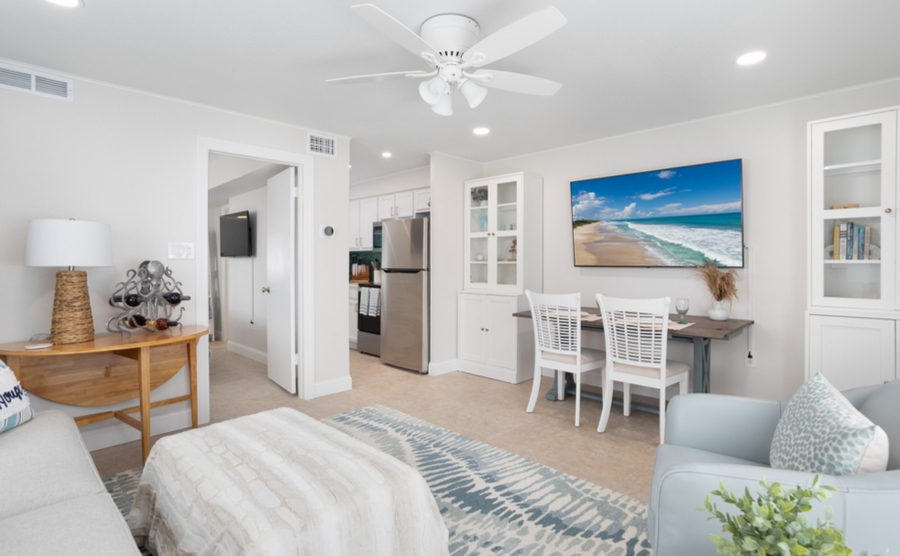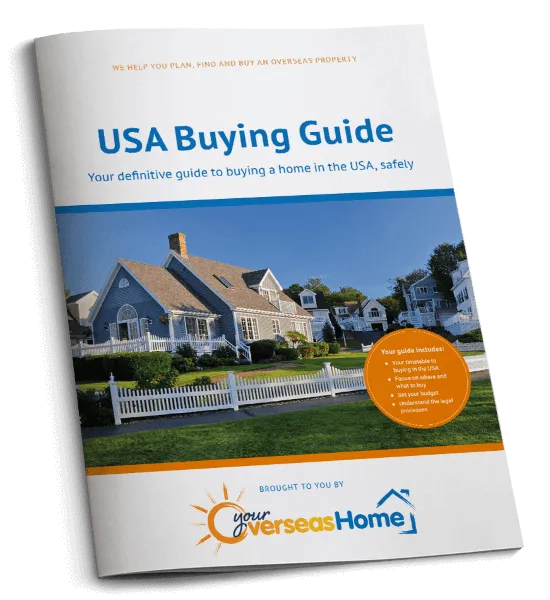Decided 2024 is the year to snap up your own Sunshine State vacation home? To set you off on the right foot, we highlight five potential hazards for foreign buyers new to the quirks of Florida’s real estate market. We know – it’s hard not to be distracted by the state’s thrilling leisure attractions and theme parks, not to mention the stunning beaches! But stay focused during your search for a property and you should be guaranteed endless fun for years to come.
Find homes in the USA via our property portal.
Get in the zone!
Nine out of ten vacation homeowners in central Florida rent out their property to holidaymakers. Chances are you’re thinking of doing the same. Makes sense – being a year-round destination means annual occupancy rates in Florida are very high. Be sensible and you should generate enough income to cover your running costs, while leaving a bit of spending money for your own trips there.
Just beware! Not every property can be rented out for holiday or so-called short-term rentals (STR), which refers to bookings of less than 30 days. Crucially, to do this your property must be located within one of Florida’s STR zones. You are also obliged to register with the State for STRs and obtain a rental business licence. These rules apply only if you rent out your property more than three times a year for stays of less than 30 days.
The epicentre of Florida’s vacation market, Orlando’s STR zone is predominantly south and south-west of Disney World. Shaped like an upside-down triangle – and often called the ‘Golden Triangle’ – its top edge follows Highway 192 and its bottom corner ends just north of Haines City. Bisected by Interstate 4, giving fast access to Orlando city, the airport and theme parks, it stretches as far as the metropolises of Kissimmee and Davenport on its eastern side.
The key takeaway here is check and double-check your property is in an STR zone if renting to holidaymakers is an absolute must for you. Your realtor should advise and any listings should show this.
Be fussy about your management agency
To run year-round vacation rentals successfully you need a reliable, efficient and honest property management agency. It’s a brave person who tries the DIY route when you live thousands of miles away. Sadly, horror stories about management firms ripping off absent foreign clients who trust them to care for their property and paying guests exist. Under-declaring the rent received, phoney claims for expensive maintenance bills, pocketing guests’ deposits – just a few of the ways swindling agents operate. It’s not unusual for new homeowners to change management agency after their first or second year. So choose yours carefully from the start and you’ll avoid nasty surprises – there are plenty of excellent ones out there.
Where to look? Chances are your realtor or their affiliated brokerage offers their own in-house management service or can refer you to preferred companies – this is a good place to start. Consider first-hand recommendations from satisfied people you know or meet. When considering agencies, check their business credentials and history, ask to speak to existing clients and look for accreditations and memberships of trade bodies, such as the Central Florida Vacation Rental Professionals (CFVRP), Better Business Bureau (BBB), Vacation Rental Managers Association (VRMA) and/or Vacation Rental Housekeeping Professionals (VRHP).
Floods and hurricanes – how exposed are you?
It’s no secret Florida gets hit by hurricanes and floods. That said, it’s the coastal areas that feel the brunt of these forces of nature and tend to suffer the worst damage. It’s no coincidence Walt Disney put his theme park in the middle of state, after studying the local weather patterns for years!
What does this mean for property-buyers? Two things to consider – construction standards and insurance. Addressing the former, the newer your property the less you have to worry about. Florida has some of the strictest construction regulations in the US and developers must adhere to a building code, introduced in 2001, that is constantly evolving. It was last updated in 2015, requiring new roofs to be attached to homes in a sturdier way and have special coating to prevent water leakage. Crucially, all new homes should come with either impact resistant windows or hurricane shutters, preferably electric so they can be shut quickly.
Most damage caused by hurricanes these days tends to be caused by natural debris, such as trees, shingle tiles from older properties or poorly secured pool cages. If you buy somewhere with a pool cage, make sure it is connected to your property on at least two sides.
In terms of insurance, standard homeowners insurance usually covers damage caused by storms, including hurricanes. Insurers consider the age and construction of your property and the more ‘wind mitigation’ measures on your home, such as shutters, shatter-proof windows, roof attachments, the less your premium. Pre-2001 homes with no mitigation will be higher to insure. So, if you’re buying an older property, you really need to check the condition of the roof and decide upgrades might be needed.
Flood insurance is usually a separate policy and is required by law in ‘high-risk zones’. Highly recommended for properties along Florida’s coastline, buyers in Orlando and inland Florida should take advice from their realtor. What often catches new homeowners out is the cost of insuring their new home in Florida – it is high, typically from $4,000-$5,000 (with hurricane cover) for a $300,000 property, depending on location.
Take heed of HOAs!
Familiarise yourself quickly with the term homeowners’ association (HOA) – you’ll hear it a lot. Every community or resort has an HOA, a board usually made up of homeowners but sometimes an external managing company. Its job is to set and uphold rules within the community and oversee the maintenance of all the communal facilities, including the collection of fees from all homeowners. In older, more residential communities, facilities might only include gardens, a clubhouse and communal pool. In newer, more sophisticated resorts they could include all these things plus 24-hour security, a gym and fitness area, kids’ parks, cinemas and games rooms, even a small water park and sports pitches.
Unsurprisingly, the more amenities to look after, the higher the HOA fees. Not all communities include the same costs in their HOA, so look at the details carefully when comparing. Typically, fees are charged by the square foot of each property and paid monthly by the owner. They can range from $100-$200 for a small property within an older more residential community into the $1,000s for a luxury more tourist-oriented property with access to lots of leisure amenities.
To avoid any unexpected shocks, before buying any property check what its HOA fees are. Also get a feel for how the HOA operates within the community and find out if homeowners are subject to any undesirable rules.
Don’t ignore the exchange rate
Not planning your payments to the US puts you in danger of losing money. At some point you will need to transfer sufficient funds to the US to pay for your property transaction. The process has two steps – exchanging your own currency into dollars and sending the dollars to the US. To make sure you get the best exchange rate and your dollars are transferred safely and quickly, use international payment specialist Smart Currency Exchange.
Exchange rates never stop fluctuating, which means the cost of your US property in your own currency moves constantly too. This can make it hard to budget properly. A $400,000 property cost approx £305,000 in July 2023 when the rate was £1/$1.31; in Feb 2024 the same property would cost you £317,000 due purely to the rate being £1/$1.26. Smart Currency can propose solutions for getting rid of this uncertainty and fixing the cost of the transaction in your own currency (as well as dollars) in advance of completion, bringing peace of mind to the process.
Too often buyers who fail to speak to a currency specialist and plan their dollar transfers pay more for their US property purchase than they need to – don’t be one of them!
You might also enjoy reading:














